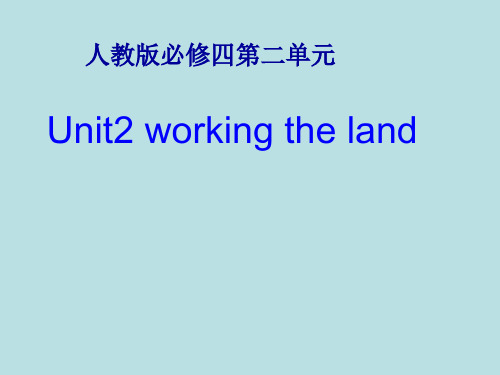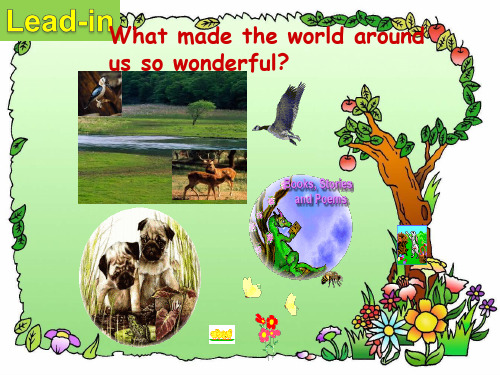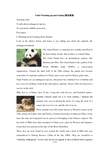高一英语模块2 Unit4 Warming up and readning
人教版英语必修二Unit 4(Warming up and Reading)教学同步课件(共29张PPT)

3. It can be learned from the passage that _____
A. the Zimbabwe government did a good job in saving the elephant.
B. the rainforest produces drugs that are good for millipede insects
1. Antelopes in Tibet become endangered because______.
A. they are killed by other animals for food. B. the environment is badly polluted C. people kill them to use their fur D. their food chain(食物链) is cut off
20
RHuempaonrtb:evinogics esshooufldw(silhdoluiflde n(gotr)o…u,p work)
so that …
Human beings should (should not) …, in order to …
Human beings should…
Make laws to …
Protect the environment in order to … …
Human beings should not…
Destroy our environment. Hunt us for… …
Human beings should…
Make laws to prevent people from killing or hunting us.
高一下学期英语必修4Unit2Warmingupandreading课件(1)

Dr Yuan Longping was a pioneer of agriculture in China.
He 1
(graduate) from Southwest Agriculture in
1953. Since then he devoted his life 2 finding ways to
comfortable life. C. He enjoys a simpler life than most rich
and famous people. D. He is satisfied with his life because he is
now rich and famous.
Personal information
a. He was born into a poor farmer’s family . b. He graduated from Southwest Agriculture college. c. In 1950,Chinese farmers produced 5.5 million tons of rice. d. 20 millon tons of rice was produced by growing his hybrid rice. e. He searched for a way to increase rice outputs without expanding the area of fields. f. He helps rid the world of hunger by circulating
• suffer from starvation and starve to death
• feel scared / be panic (惊慌)
【公开课课件】必修二Unit 4 warming up and reading

Q2. Which places did she go?
Daisy
antelope
elephant
monkey
Tibet
Zimbabwe
rainforest
Suppose you are Daisy and your partner is one of the animals (the antelope, the elephant and the monkey),then make a dialogue and act out.
Protecting wildlife is protecting ourselves!
Animals are our friends.
No animals, no human beings!
Homework
1. Read the passage carefully to find out the sentences you can not understand thoroughly and underline them. 2. Finish the texebook on P27 1.
Who am I ?
I live in the sea. I have a hole on the top of my head. I am the largest mammal(哺乳动物) in the world.
Whale
What do they have in common?
Why are they
Warming up and Reading
Who am I ?
My long teeth can be made into art works. I can use my nose to carry heavy things.
新课标人教版高一年级英语必修二第四单元第一课时-- Warming up and reading课件

What has been done to solve the problem? How effective are the measures?
How can we help these animals?
1. We can help endangered animals by protecting their habitats, creating new habitats.
WWF is one of the world's largest and most respected independent conservation organizations. It is an independent foundation registered under Swiss law, acting locally through a network of over 90 offices in over 40 countries around the world. Its mission is to stop the degradation of the planet’s natural environment and to build a future in which humans live in harmony with nature
1. How did the elephant feel and why?
The elephant felt excited because he thought Daisy went to take pictures of him.
Unit four Wildlife protection
What made the world around us so wonderful?
人教高中英语必修2Unit4 Warming up and Reading 课件

One day ,Daisy_d_r_e_a_m__ed_a strange dream. She flew in a wonderfulc_a_r_p_e_tto talk with an __a_n_te_l_o_p_e_in
Tibet. The antelope told her they were hunted
Animals are our friends. No animals, no human beings! Let’s live in harmony!
1.Try to retell the whole story.
2.Make up dialogues between Daisy & Antelope in Tibet Daisy & Elephant in Zimbabwe Daisy & Monkey in thick rain forest
Thank you very much!
4.The elephant used to be well protected in Zimbabwe. usedn’t
5.In Zimbabwe, tourists love to see the
elephants.
much money
6.The farmers in Zimbabwe get nothing from
_a_r_r_iv_e_d_at the thick rain _f_or_e_s_t_where a monkey told her”No rain forest,no_a_n_im__a_ls_and no_d_r_u_g_s.”
Although finally everything was _g_o_n_e_,she had_l_e_a_r_n_e_d_so much!
人教课标版高一英语必修2Unit4 Warming up and reading精品教案

Unit4 Warming up and reading精品教案Teaching AimsTo talk about endangered speciesTo read about wildlife protectionProceduresI. Warming up by learning about animalsLook at the photos below and listen to me telling you about the animals, the endangered animals.The Giant Panda is a mammal now usually classified inthe bear family, beside, that is native to central China.The Giant Panda lives in mountainous regions, likeSichuan and Tibet. The Giant Panda is the symbol of theWorld Wildlife Fund (WWF), a conservation organization. Toward the latter half of the 20th century, the panda also became somewhat of a national emblem for China, and is now used in Chinese gold coins. Giant Pandas are an endangered species, threatened by continued loss of habitat and by a very low birthrate, both in the wild and in captivity. About 1,600 are believed to survive in the wild.Milu deer is a Chinese deer. It has a long tail, wide hooves, and branched antlers.Another Chinese name for it is “four unlikes,.” because theanimals were seen as having the horns of a stag, the neck of acamel, the foot of a cow, and the tail of an ass.These animals were first made known to Western science in the 19th century, by Father Arm and David, a French missionary working in China. At the time, the only surviving herd was in a preserve belonging to the Chinese emperor. The last herd of Milu deers that remained in China were eaten by Western and Japanese troops that were present at the time of the Boxer Rebellion.These deer are now found in zoos around the world, and a herd of Milu deer was reintroduced to Dafeng Reserve, China in the late 1980s. They are classified as “critically endangered.” in the wild, but do not appear to have suffered from a geneticbottleneck because of small population size.A tiger is a large cat famous for its beautiful fur oforange striped with black. Tigers live in Asia and arebecoming very rare. This is due to people huntingthem for their fur and destroying the forests they live in.II. Pre-readingDefining wildlifeWhat does the world wildlife mean?The term wildlife refers to living organisms that are not in any way artificial or domesticated and which exist in natural habitats. Wildlife can refer to flora (plants) but more commonly refers to fauna (animals). Needless to say, wildlife is a very general term for life in various ecosystems. Deserts, rainforests, plains, and other areas—including the most built-up urban sites—all have distinct forms of wildlife. Humankind has historically tended to separate civilization from wildlife in a number of ways; besides the obvious difference in vocabulary, there are differing expectations in the legal, social, and moral sense. This has been reasonfor debate throughout recorded history. Religions have often declaredcertain animals to be sacred, and in modern times concern for theenvironment has provoked activists to protest the exploitation ofwildlife for human benefit or entertainment.Make a list of other endangered wildlife in China that is being protected.Pre-reading questions:Reading to the recordingNow turn to page 26, listening and reading to the recording of the text. Try to keep pace with the native reader, making your reading resemble that of the reader, in speed, in intonation and in pronunciation.III. Reading1.Reading and getting informationNow you are to read the text for information to fill in the form.2.Reading and underliningNext you are to read the text and underline all the collocations at the same time.IV. Closing up by matching animals to five risk categoriesDifferent endangered species appear on different endangered species lists. And people who are trying to protecting animal use the following five risk categories to group the unlucky animal.Now in groups of four try to group all the unlucky animals found in China.。
英语高一必修二学案:Unit_4_Wildlife_protection_Period_2_Language_points_in_Warming_up_and_Reading
Book 2 Unit 4 Wildlife protectionPeriod 2 Language points in Warming up and Reading (I)导学目标1.熟记学案中所列出的单词和短语: decrease, die out, hunt, in danger of, relief2.通过对这些词汇的理解能够更深层次地理解课文,同时会用这些词汇造句自主合作学习v t.& vi.减少;(使)变小;或变少 n.减少,减小,their numbers may decrease.(P25)如果它们的栖息地受到威胁或是它们找不到足够的食物,它们的数量就会减少。
They are making every effort to decrease the production cost.他们正尽力降低生产成本。
年出生率正在下降。
减少到/了…… a decrease in...在…方面减少了decrease from...to...从…减少到…increase vi. & vt. 增加;增长;增强n.增加;增加的数量increase to/by ...增加到/了…… on the decrease/increase 在减少/增加小麦价格降低了15%。
介词填空②The club members decreased ______________ two hundred compared with last year.③The housing price is hoped to decrease ___________ 10% this year.④To our delight, varieties of birds in the forest are ____________ the increase.结果濒危动物甚至可能要灭绝。
This kind of bird is dying out. 这种鸟即将灭绝。
人教高中英语必修2Unit4 Warming up and Reading 课件
B
Part2 (para. 2 )
C
Part3 (para.3-4 )
A
A. What we can get from wildlife protection. B. Why we need wildlife protection. C. A good example of wildlife protection.
A. happy B. grateful C. sad
Read para. 2 and tell the statement True or False.
F1
The elephant used to be well protected in Zimbabwe.
T2 In Zimbabwe, tourists can hunt a certain
antelope
elephant monkey
Tibet
Zimbabwe rainforest
How
With the help of the _f_ly_i_n_g__c_a_r_p_e_t_
Read para. 1 and do the multiple choice.
1.Why are people hunting and killing the
In Zimbabwe
The government allowed tourists to ④__h_u_n_t__ only a certain number of animals if they paid the farmers. The number of elephants is ⑤_in_c_r_e_a_s_in_g_. Good things are being done to save local wildlife.
人教版英语必修二Unit 4(Warming up and Reading)教案
Unit 4 Wildlife protectionPeriod 1 Warming up andReadingTeaching Aims(教学目标):1. Train the students’ reading ability.2. Learn some useful words and expressions.3. Learn more about the endangered animals and wildlife protection.Teaching Important Points(教学重点):1.Help the students to understand the passage better.2.Learn and master some important words and phrases in this period.Teaching Difficult Points(教学难点):1.How to help the students improve their reading ability and understand the passage better.2.How to master the important language points in this passage. Teaching Methods(教学方法):1.Fast reading to get the general idea of the text.2.Careful reading to understand the passage better.3.Explanation to help the students master some language points.4.Discussion to help the students understand better what they’ve learned and to use the knowledge they’ve learned in this period.Teaching Aids:(教学工具)1.A multimedia.Teaching Procedures(教学步骤):Step 1 Lead-in(导入)1.Greet the students as usual.2.Introduce the topic of wildlife protection.Show the pictures of some endangered animals and let the students name them in English.Step 2 Skimming(略读)T:OK,you have got the general knowledge of endangered animals. Now today we are going to learn a story about the experience of a little girl called Daisy. She has been to three places,and met three different kinds of animals. Which three places has she been to? What endangered animals are they? Now,I will give you a few minutes to skim the text to find out the three kinds of endangered animals in three different places and put them in the right blank of the form.Step 3 Scanning(查读)T:OK,class,you now have a general idea about the text. This text is mainly about Daisy’s experience. She has been to Tibet,Zimbabwe and the rain forest. She has talked with antelopes,elephants and monkeys separately. Now let’s go in detail and findmore information about these three places and animals.T:I’ll give you 5 minutes to scan the text and fill in the blank.Step 4 Intensive Reading(细读)Ask the students to look through the questions on Page 27 and read the text silently. Students are expected to sum up the main ideas by themselves.Para1Daisy flew in a flying carpet to ____ and found that ________ were in danger. They were _____ for the fur to make ________.Para2Daisy flew to _________ and found that the wild animals were well ________ by paying farmers to visit animalsPara3-41.Place: _________2.Animal:_________3.What is it doing?____________________________________________________________________4.Fine out one sentence which tells the importance of rainforest._____________________________________________________ _______________Step 5 Discussion(讨论)After the explanation of the language points,students have got the total understanding of the reading text. Then teacher draws students’ attention back to the text and to think about the topic “What should we do to protect wildlife?”.The possible advice:1.We should treat the wildlife plants and animals the same as our friends and relatives.2.We shouldn’t cut or kill them freely.3.We should protect the environment around us to let them have enough food and good living conditions.4.We should not buy the luxury such as fur,etc to support the protection campaign.5.We should collect money to protect the endangered animals.6.We can join the WWF to protect the endangered animals with the other protectors all over the world.Step 6 Summary and Homework(作业)。
英语高中新课标模块二 u4 warming up & reading
Decide whether each of the following statements is T or F.
1.Daisy saw many antelopes in Tibet. 2.Daisy’s sweater was made of sheep wool. 3.In three years the antelope may die out. 4.The elephant used to be well protected in Zimbabwe. 5.In Zimbabwe, tourists love to see the elephants. 6.The farmers in Zimbabwe get nothing from the elephants now. 7.This is a real story in Daisy’s life.
3.What situation is it in?
A.They are over hunted B.They lose food C.The place where they lived in is The being destroyed
Rain Forest
4.Why is the thick rainforest important for animals? Because different kinds of animals can live together.
in danger treasure.But They are ________________. They are endangered animals. ___________ They are________________. dying out
What’s the problem of these animals commonly facing?
- 1、下载文档前请自行甄别文档内容的完整性,平台不提供额外的编辑、内容补充、找答案等附加服务。
- 2、"仅部分预览"的文档,不可在线预览部分如存在完整性等问题,可反馈申请退款(可完整预览的文档不适用该条件!)。
- 3、如文档侵犯您的权益,请联系客服反馈,我们会尽快为您处理(人工客服工作时间:9:00-18:30)。
farmers _______ used to hunt them
now farmers ____ them like
A __________ insect affects millipede mosquitoes Rain forest No __________,no rain forest drugs saw_________ ________and no _______ monkey animals
tiger
panda
antelope
Why are these animals dying out?
too much hunting
What do people kill them for?
fur & skin
meat
tusk/ivory
Why are they in danger of dying out?
Unit4 Wildlife protection Wild animals
wildlife: animals or plants which live or grow _________________ in natural conditions _________________
Tibetan antelope(藏羚羊)
Her response(反应): cried
In Zimbabwe She discovered:
being
watched by an elephant used to be hunted without mercy
elephants now
the number of elephants are increasing
III. Read the text again and decide whether each of the following statements is true or false. 1.Daisy’s sweater is made of sheep fur ( F ) 2.The antelope has been protected by far.( F ) 3.The elephant used to be well protected . ( F ) 4.The rhinos have been well protected now. ( T) 5.There are no animals or no drugs in rain forests.( F )
The problem the pandas face in China is that they do not have enough food because of the loss of bamboo growing areas. To solve this problem, China has set up a protection zone in Sichuan Province for the pandas. It is called the Wolong Nature Reserve. Thanks to that, things have changed for the better. The number of pandas has risen from very few to around 1,600 after the increase of bamboo areas for the pandas.
A little girl named Daisy travelled to three areas and talked with three different animals on a flying carpet, which made her know the importance of the wildlife protection.
the
monkey protects itself from mosquitoes by rubbing a millipede.
the
millipede contains a powerful drug which affects mosquitoes
“You should pay more attention to the rainforest where I live and appreciate how the animals live together. No rainforest, no animals, no drug.”
The end of the trip
Daisy’s plan: tell WWF to produce the new drug What had Daisy learned : Visit to Tibet: Why we need wildlife protection Visit to Zimbabwe: A good example of wildlife protection Visit to rainforest: What we can get from wildlife protection
Tibet Zimbabwe Rainforest
In Tibet She discovered:
antelope looked antelopes are antelopes are
sad
being killed for the wool beneath their stomachs now an endangered species
South China Tiger 华南虎
panda
crocodile
milu deer
elephant
leopard
rhino
golden monkey
lion
zebra
giraffe
Do you know what endangered animals are dying out in China?
Retell the story
dreamed One day ,Daisy________a strange dream.She flew in a carpet talk antelope wonderful_______to _____with an_________in Tibet.The antelope told her they were hunted because of fur sweaters their _____which can be used to make ________like hers.In three years they may all be ______.Later,she gone flew ______to Zimbabwe where she talked with elephant an_________and got to know the farmers there no longer government ______them.That’s because the ____________decided to hunted help and the farmers finally made a lot of money ______.At last she arrived the thick rain forest _______at ______where a monkey told animals drugs her”No rain forest,no_________and no______.”Although gone learned finally everything was _____,she had________so much!
Unit 4 Wildlife Protection
Reading
Wild plants and animals have to look after themselves. They need food, a good e___________ and safety. If their habitat is nvironment t________ or they can not find enough food, their hreatened a numbers may decrease. _____ As _____ _________ result these endangered animals may even _____ ______. They need help. This is what wildlife die out protection is all about.
A report on some endangered wildlife in China
The problem the … face in China is that ….
To solve this problem, …..
It is called…
Thanks to that, things have changed for the better. The number of ….
A : It is about some protection of wildlife. B: It is about a journey of a flying carpet.
C: It is about Daisy’s wonderful experience with some animals.
Climate Food… Habitat
What problems do they have to face?
People’s activity Environment
Natural enemy
Jackie Chan is calling for protecting wild animals! Message from Jackie Chan: “I find out some of the terrible things that happened to the wildlife. The tiger is killed for its bone. The rhino (犀牛) is killed for horn (角), the elephant is killed for ivory (象牙), the turtle (乌龟) is killed for its shell (壳), the bear is killed for its gall bladder (胆 囊). So please help me to help animals. Never buy endangered species products. Remember when the buying stops, the killing can too."
